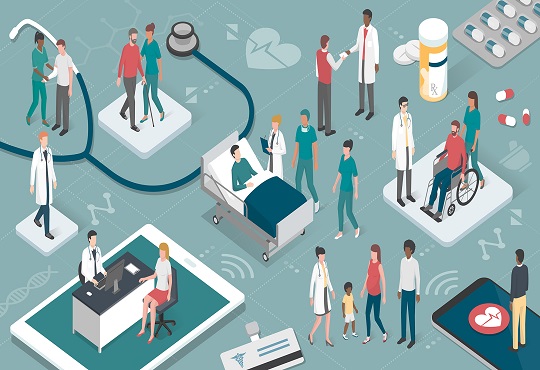How e-health will transform the healthcare industry
Abhrasnata Das | Thursday, 06 January 2022, 14:40 IST

e-health and the use of technology will change the way healthcare is delivered in the future. There is no limit to how much better health and social care can be delivered. An increasing body of research shows that e-health has the potential to save costs, enhance access, and improve results while providing a more flexible and individualized approach to care delivery.
In the coming days, e-health solutions will transform the healthcare sector by making data and information more accessible to patients, caregivers, and health care professionals, improving quality and results. Patients will be empowered by mobile technology, which gives them better access and control over their treatment.
In this article, let’s explore the impact that e-health is to establish on the healthcare segment.
Telemedicine and remote healthcare
Telemedicine and linked healthcare solutions have been increasingly popular in recent years. COVID-19's recent appearance has exacerbated this trend, compelling healthcare institutions and providers to swiftly adjust to providing treatment remotely.
By reducing hospitalization and delivering treatment without the need for patients to attend the hospital, telemedicine solutions have the potential to drastically reduce costs and enhance the quality of care. They also increase patient access to healthcare data and services by eliminating the need for people to take time off work or wait in lengthy lines at the doctor's office or hospital. Remote care is especially crucial for persons with mobility issues or those who live in rural areas.
The development of remote care and monitoring necessitates safe access to healthcare data. The benefits of these technologies can only be realized through information exchange and collaboration inside a healthcare organization, among healthcare providers or regions, and between healthcare professionals and their patients.
Interoperability
Today, it is usual for a patient to obtain healthcare from a variety of sources, including primary care clinics, hospitals, laboratories, and other specialists, with each visit yielding useful health data. This health data must be accurate, accessible, and interchangeable amongst healthcare practitioners, organizations, and patients in order to be valuable.
Interoperability in healthcare refers to the capacity to communicate and receive medical data from various sources between different systems, organizations, or locations. Interoperability is now only partially realized in certain situations, but there is a growing demand for system and stakeholder connectedness, as well as adherence to open system standards.
Within hospitals, interoperability is especially critical for specific processes like those in emergency rooms and maternity units. Real-time access to patient information at the point of care can prove lifesaving in these departments.
Connectivity and interoperability are critical for realizing the full potential of health data in enhancing patient care. As the demand for niche solutions to support a wide range of specialized workflows across different domains within the healthcare system grows, so does the demand for interoperability.
clinical decision support
The next generations of information technologies, such as big data, cloud computing, and artificial intelligence, are one of the most intriguing themes in eHealth, with the potential to revolutionize healthcare fundamentally.
Patients may now utilize wearable gadgets to track their health around the clock, consult virtual assistants for medical advice, and access a range of cloud-based health services. Healthcare workers can access remote patient data and use clinical decision support tools to help with diagnoses and treatment choices.
e-health solutions can reduce the cost of medical treatment, improve patient diagnoses and outcomes, and increase the effective use of medical resources by using developing digital technologies. Cloud-based systems, in particular, are becoming increasingly important in the delivery of self-care and healthcare services.
The usefulness of cloud-based healthcare services will only grow in the future as healthcare technology progresses, such as automatic data collecting through remote health monitoring systems and big data analytics.
Challenges to overcome
The e-health care solutions have raised several challenges that affect patients, medical professionals, technology developers, policymakers, and others. Data interoperability is a constant difficulty due to the large volumes of data generated from a range of systems that store and code data differently.
Furthermore, problems include issues such as patient digital literacy and the ensuing uneven access to healthcare, as well as data storage, access, sharing, and ownership. As a result of these issues, problems about security and privacy arise.
The Future
The recent e-health solutions are coming up with huge possibilities to enhance healthcare. Specialized eHealth solutions are already assisting healthcare organizations in improving patient care, increasing clinical efficiency, and lowering costs.
Health Information Technology (Health IT), which includes health record systems, smart devices, and applications, is critical to improving patient care. It encourages the collection of patient data in order to enhance healthcare delivery, as well as boost patient safety, reduce medical mistakes, and improve patient-provider engagement.
Using the potential of specialist eHealth solutions is a critical step toward creating a future-proof and sustainable healthcare system.




